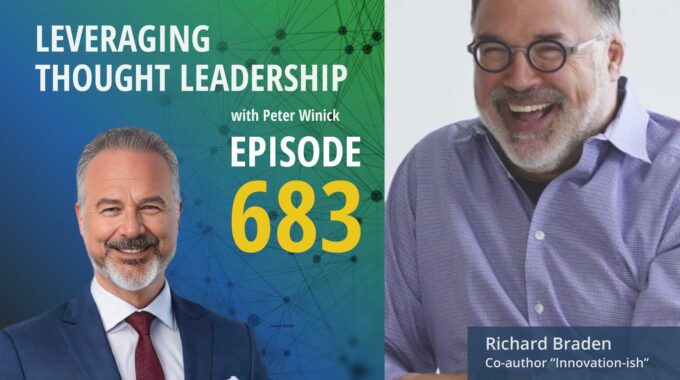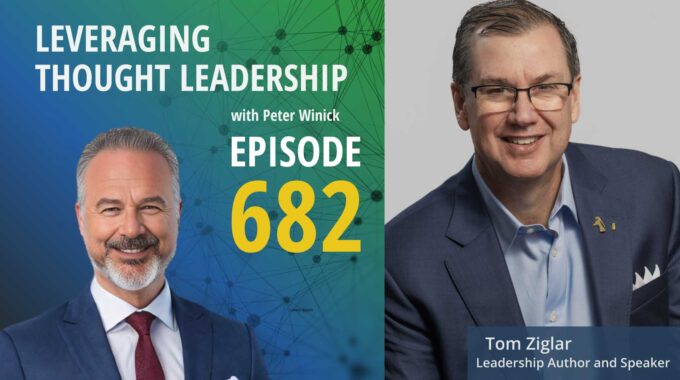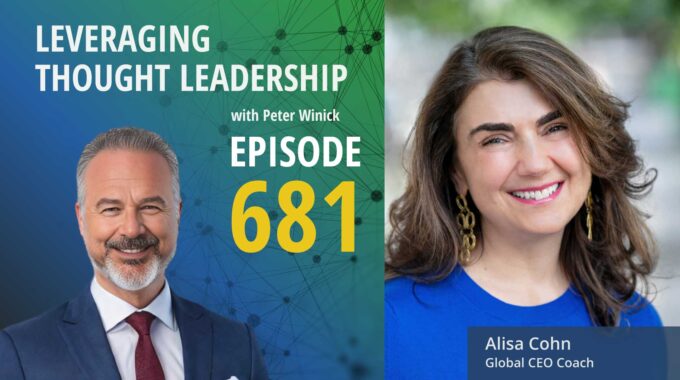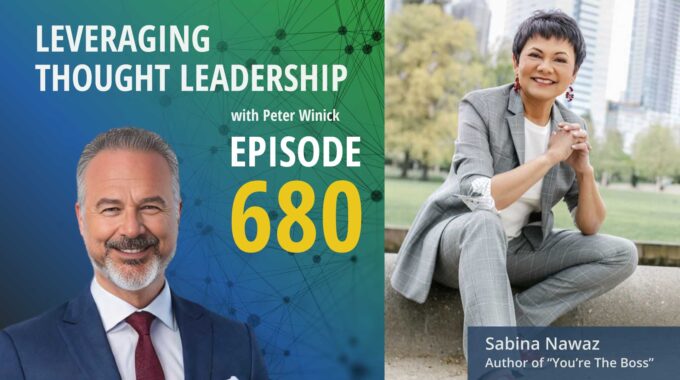A Hybrid Model That Blends Capability Building with Business Outcomes This episode explores how to…
Harnessing the Power of Setbacks | Amy Shoenthal
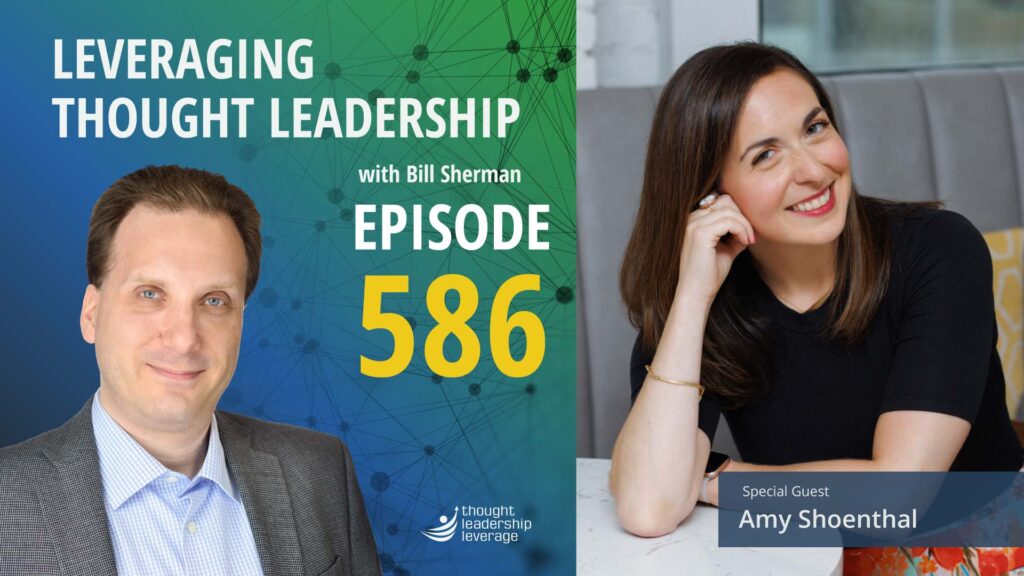
How to Transform Challenges into Opportunities for Growth
A conversation with Amy Shoenthal on how she turned decades of work into a step-by-step framework for overcoming Setbacks.
Amy Shoenthal, USA Today bestselling author of “The Setback Cycle: How Defining Moments Can Move Us Forward,” joins Bill Sherman on the Thought Leadership Leverage podcast. Amy is a seasoned journalist and marketing executive with 20 years of investigative reporting. Her passion for profiling founders, executives, and leaders who take risks and create something new began at the University of Maryland, where she reported on student entrepreneurs.
Amy’s book, “The Setback Cycle,” explores how setbacks can lead to success. She discovered a pattern: significant achievements often follow major setbacks. In numerous interviews, she noticed that transformative ideas often arose after overcoming significant challenges. She researched extensively, consulting psychologists, neuroscientists, and executive coaches to develop a step-by-step framework for overcoming setbacks.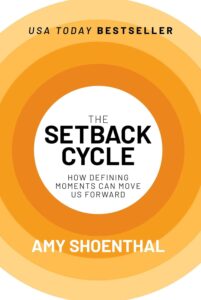
One surprising finding? Many people fail to recognize when they’re experiencing a setback, making it harder to recover. Amy’s framework helps identify setbacks early and provides tools to rebuild. She emphasizes that acknowledging a setback is the first crucial step towards recovery. Ignoring or denying a setback can make it more difficult to move forward and find new opportunities.
Amy was driven to create not just a narrative but a practical guide. She wanted to understand the common threads that enable individuals to rebuild and succeed after setbacks. Her book offers a playbook for anyone facing life’s inevitable challenges, providing both inspiration and actionable steps.
Her goal? To make the concept of the “Setback Cycle” part of our cultural lexicon. Amy hopes people will see setbacks through the lens of her framework, allowing them to emerge stronger and more resilient. She envisions a world where setbacks are viewed as opportunities for growth and innovation, and where everyone has the tools and resources to navigate adversity.
Three Key Takeaways:
Setbacks as Catalysts for Success: Amy Shoenthal’s research reveals that significant achievements often follow major setbacks. Her book, “The Setback Cycle,” emphasizes how overcoming challenges can lead to transformative ideas and innovations.
Recognizing and Addressing Setbacks: One of the critical insights from Amy’s work is the importance of recognizing when you’re experiencing a setback. Identifying and acknowledging a setback is the first step in the recovery process, allowing for a proactive approach to rebuilding and finding new opportunities.
Framework for Resilience: Amy has developed a step-by-step framework, backed by extensive research and consultations with psychologists, neuroscientists, and executive coaches. This framework provides practical tools and strategies for individuals to navigate setbacks, emerge stronger, and turn adversity into opportunity.
If you feel like your Thought Leadership is having a Setback, make sure to check out Amy’s framework for overcoming it as well as this Four-Part Framework for Thought Leadership.
Transcript
Bill Sherman Do you have a passion for a topic that isn’t being talked about? You see, there’s a gap in the conversation. Perhaps you go to Amazon. Search the topic for a book and can’t find one. Then you go to Reddit and there’s no subreddit community. These gaps in the conversation aren’t always obscure and niche. Sometimes there are larger topics that haven’t been explored or haven’t been looked at from a particular perspective. My guest today is journalist and bestselling author Amy Sherman Paul, whose latest book, The Setback Cycle How Defining Moments Can Move Us Forward. Explores one of these topics that hasn’t received as much attention as it deserves. In today’s episode, we talk about what we can learn from failure. Is there a process? How does it apply to thought leadership? And we also explore Amy’s journey in the practice of adult leadership. I’m Bill Sherman and you’re listening to Leveraging Thought Leadership. Ready? Let’s begin. Welcome to the show, Amy.
Amy Shoenthal Thank you for having me.
Bill Sherman So you’ve had an area of interest and investigation and reporting for 20 years now. And I want to ask you, what is it that has you so interested and continue to be interested around founders?
Amy Shoenthal So it’s not just founders that I profile, it’s also executives, leaders, anyone who’s had an interesting career path that others might want to learn from. I think that founders always come to the forefront of my stories because in order to be a founder, you have to take a lot of risks. You have to be very creative, and you have to find a way to build something that no one has built before. And that just requires a lot of perseverance. And I think leadership and human qualities that so many people, especially my readers, really admire. And so I think that’s why I have written so many profiles and even trend pieces centered around the work of innovative founders and leaders.
Bill Sherman And with that, as a founder, certainly you’re taking a public risk where is often an established organization. It’s a distributed risk. You don’t have the same degree of risk on resting on your shoulders. Right.
Amy Shoenthal That’s right. That’s right. When it’s your company it’s you. It’s personal. You know.
Bill Sherman It’s not. It may be the name on the door sort of thing as well. So. Yeah. So let’s go back in time. 20 years ago, you started doing some writing and research and tied to the incubator that was on your campus. Let’s start there.
Amy Shoenthal Yeah. This is where I really started in sharing the stories of people who were building really great companies. I was a journalism student at the University of Maryland, and I just needed a job, like a part time job to make money so I could, you know, have money, support myself, pay my bills, and.
Bill Sherman As we do as students. Yeah.
Amy Shoenthal We do. Exactly, exactly. And so I, got a job at there was someone who wanted to get a student, you know, assistant or PR coordinator at something called the Maryland Enterprise, the Maryland Technology Enterprise Institute. And that had a lot of components, one of them being a tech incubator for startups and students who were creating companies from their dorm rooms. They wanted to make sure that some of the stories of the students and the companies they were creating was getting a little bit of press. And so they came actually to the journalism school to recruit us, because they wanted someone who could write and who could tell stories. And to me, it was just like, well, here’s a job that pays pretty well, so I’ll take it. I ended up loving it so much because it wasn’t, you know, it was a little bit outside of my standard and traditional journalism education and that formal training I was getting as a student who wanted to, like, write for newspapers and magazines, but I was using the same skills to write press releases and to talk to the media. It was like I was on the other side of it, but I was doing something that really let me up and got me excited, because I got to be the first to really digest these stories, and then I had to put it out into the world in a way that made sense for an audience to receive it. And so that was really the beginning, that those were really the seeds of my public relations and then marketing career. But I never abandoned that storytelling, that journalism, because I always freelanced on the side. And fun fact, one of the people I interviewed in his dorm room on campus went on to become the founder and CEO of Squarespace. So it was a great program and it birthed great leaders into the world.
Bill Sherman So let’s take a look at the concept of setback, which is the focus of your book. Right. Where did you start to realize there was a conversation to be had around setback? And how did this book come to be?
Amy Shoenthal Well, I notice that in almost every telling when I would ask someone, hey, what in your career led you to this moment, to this thing I’m interviewing you about, to this thing you created that’s getting a lot of attention, that’s changing lives, that’s helping society in some way. And it seemed like the pinnacle of every story went back to some, you know, really defining moment that happened after they lifted themselves up out of a setback. And when you when you do something a lot, you start to see themes. And I kept seeing this theme over and over and I started exploring, you know, started doing research to see if there was any literature around it, because I didn’t really understand what it was. I hadn’t arrived at the concept of the setback yet. I thought, oh, maybe it’s like post-traumatic growth or people learning from their mistakes or, you know, reframing difficulty as opportunity, you know, kind of things, you know, kind of lives and things that have been written about. But then I, I really couldn’t categorize everything I was seeing under, you know, one of these buckets. But when I arrived at the definition of a setback, which the dictionary definition is a reversal or check in progress. So it’s when you’re moving forward towards a goal or having some sort of, you know, path that, something that you’re working towards and you’re unexpectedly bumped backwards. And I think it’s that unexpected part that really, really resonated with me when I saw that definition, because that the term setback really applied to everything I was seeing in my interviews, because we really got into like, the messy middle that propelled them forward. And it was always a setback. It wasn’t always a trauma, it wasn’t always a mistake, but it was always a setback. And so when I started digging into the concept of the setback, there really wasn’t much out there. So I would read business psychology books and it would touch on it, but they didn’t, like, really explore it in depth. And then I said, well, if I’m writing a book about setbacks and I’m going to profile all these founders and leaders who have gone through that back to know some stories of people that you’ve heard of, some you haven’t heard of. I need to take their stories and use them to really dig into what happened and help readers navigate their own setbacks. So the point of the book is, yes, to highlight these incredible stories and give everyone all this inspiration and optimism, knowing that if they went through it, so can you. And they emerged, so can you. But also to give you a framework and a step by step action plan so that when you encounter your next inevitable setback, be it business, career, personal, societal, you know, have a playbook to help you work through it.
Bill Sherman So. I’m thinking you had this asset library, basically of interviews that you had conducted over the years. Did you start reexamining them through the lens of setback and almost coding them to say, what are the patterns that I see? Once you started keeping an eye on that?
Amy Shoenthal Yeah. I mean, I had started to key in on it already, and then I was conducting interviews with this in mind. But everyone I interviewed for the book, I went back to, you know, I write for the book, or I said, hey, I’m adapting our, you know, Forbes interview from this moment, and I’m going to put it in a book so everyone, you know, it was less about going. I mean, of course it was about going back to the stories, but they were the set back story was always there. It was always there. It was more like the stories were there. And that’s how I came up with the concept of the setback cycle.
Bill Sherman Well, and that’s where I’m going to is where, what’s the cycle? Something that came out through past interviews or did you have to go digging for it in fresh interviews to see the cycle?
Amy Shoenthal It was both. It was really both. And I, you know, I have to dig very hard to find someone. Setback story. I mean, if you’re listening to the right.
Bill Sherman Times of the steps in the process rather than just, okay, I hit adversity, adversity, and I stopped.
Amy Shoenthal Oh, so the steps and the framework and the process, that was a whole new thing. So yeah. Yeah. So how did I have to. Yeah, I had this arsenal of stories and of course I had to choose which ones I wanted to revisit and go back to some of the founders. But when I decided I wanted to come up with an action plan for people, I didn’t have all the information I needed. So I went to experts. I went to psychologists and a neuroscientist and many executive coaches. And I did a ton of research because if I was gonna come up with a framework, it needed to be evidence based, it needed to be research backed, and I needed the voices of experts who see this every day in a different way than I did. You know, I’m a journalist, I needed psychology, I needed neuroscience, I needed validation that this was truly a cycle that people had to go through, and there was some sort of universal, universal human truth to the fact that setbacks can pave the way for your most defining moments, and they can really propel you forward in a big way.
Bill Sherman But if I understand correctly, you had said, hey, I’ve identified this pattern in my interviews. Yeah, it seems to fit the definition of setback more than any of the other terms that might be in the literature out there. And let’s turn this interview from anecdote to an interview into an organized structure. And do you see the same pattern that I see? Right.
Amy Shoenthal That’s exactly it. And I had people who would say, yes, I see the same pattern. Here’s why it happens. And I had people who said, that’s not really it. Like, have you considered this? So I had people who poked holes in some of the theories I was going with. And I really, really appreciated that. And if you read the book, you’ll see that I actually outline some of the conversations that I had with people where I say, I went in thinking this, and here was their response to like, combat that. So you kind of get like a sense of the debate that was going on as the framework was formed because I, I just assumed that if I had certain assumptions about setbacks, then other people probably would do. Like when I was interviewing an executive coach at the very beginning of this journey, her first reaction was this better not be some everything happens for a reason. Kind of yeah, right, right. I was like, oh no, I don’t want people to think that. So I immediately put that in the intro because I wanted to already, you know, just like get out there in front of it and debunk it. Because and when people do say that, they always say everything happens for a reason, because they’re trying to comfort people who are in a low moment. And but that’s not always helpful. You know, sometimes people just want to like, sit in their lull. And sometimes people just want to know, like, hey, you, this stinks, but you will get through this. And I’ve taken that a step further and said, here are the tools to help you through it.
Bill Sherman And here’s the way that other people have used and we’ll get you out of this, even though the moment that you’re feeling in in terms setback sucks. Yeah, totally. Yeah. If you’re enjoying this episode of Leveraging Thought Leadership, please make sure to subscribe. If you’d like to help spread the word about our podcast, please leave a five star review at ratethispodcast.com/ltl and share it with your friends. We’re available on Apple Podcasts and on all major listening apps as well as thought leadership, leverage, dot com forward slash podcasts. Let’s detailed a couple of the findings. What are the things that you found, either through interviews with founders and their teams or talking to experts? What are those things about setbacks and adversity, which are counterintuitive?
Amy Shoenthal One of the most surprising things I found in my research was how many of us sleepwalk through setbacks, or ignore it, or pretend that we’re not in it. So identifying that you’re in a setback is phase one. Phase one is established. You have to establish that you’re in a setback before you can really work through the cycle. So many of us have been conditioned to say, everything is fine. I’ve got this. It could be worse. Other people have it worse. So I’m just going to keep going. I’m going to ignore the signs. I’m going to ignore the red flags. And maybe it’s just easier to coast along because it’s comfortable. Maybe it’s easier to just continue to try to build the thing I’ve been building because of, you know, how much time I’ve already spent and you know, the sunk cost. But that’s not always in your best interest. Sometimes admitting that something didn’t work, or that you’re in a setback or your job isn’t serving you anymore, your relationship has changed. And you have to kind of like break everything down to build it back up. If you’d admitted earlier, it might not be as catastrophic as if you wait for it to all come crumbling down.
Bill Sherman Right? So if you’re sitting in the crumbled ruins, you have less to work with to build back.
Amy Shoenthal Exactly. Build the build the foundation of what you’ll need to climb out of your setback before you’re forced to. Because if you see the signs and you ignore them, I promise you it’s going to be so much easier to start now. And you don’t have to blow up your life. You know, if you notice that you’re in a setback, you’re like, oh my God, I was passed over for that promotion. That was the only thing I was working towards this whole year. And I didn’t get it. Or I, you know, was working towards this really big pitch competition. So I would get the funding I needed to make my first hire. And you don’t get it. These are moments that can really kind of put a person in. Especially when we put all our eggs in one basket and we like just focus on one thing moving towards one goal. And we are so driven to reach that goal and then we miss it. And the thing we thought we’d get becomes, you know, obsolete. It’s really, really hard. To acknowledge that it’s been really hard and it’s harder to acknowledge, you know, it’s almost easier when there’s a big dramatic setback. It’s meant to acknowledge when. Maybe you could stay on a certain path and be okay. But if you were to reroute or course correct, it could be even better. And I find that people who acknowledge that they’re going to set back and start to take the steps to work their way out of it or do something different, they are like amazed by how capable they are, and they’re amazed by all they can achieve once they actually start moving forward. You know, based on how they consciously want to live their lives or build their careers versus just like floating along and letting inertia move them forward.
Bill Sherman It sounds like there’s a. That acknowledgment creates a sense of agency. Yeah, that may be missing. And the load of like, hey, I’m just going through the days sort of thing. And it’s an okay path. The ability to envision a different reality can like that fire to get you going.
Amy Shoenthal It can, but it can also be so terrifying. It can be so terrifying to try to, like, step out of your comfort zone and do things differently. It’s why, you know, people who stayed in jobs for like 20 years, even like five years, even though, you know, like I could be doing so much more.
Bill Sherman I love the concept of sleepwalk, right? Yeah.
Amy Shoenthal So, you know.
Bill Sherman We just get up.
Amy Shoenthal Yeah, yeah. It’s so hard.
Bill Sherman So. You mentioned something a few minutes ago that I want to turn back to. You said, hey, I want to make sure this work is supported by evidence. Okay. And so. Although you’re not an academic and as you said, you’re a journalist. That evidence informed, evidence-based approach to the work was important to you. I’d like to explore that a little bit further, if we could. And my question to you. Because this could have easily been a book that was narrative and story. Why did you want to break it down into a framework? What was it that you said that said to you? I want to get to the bottom of this and understand what the cycle is, and then be able to tell that story, because you could have told the story of individuals just as individuals.
Amy Shoenthal Well, I think the reason I was so inspired by these individuals was because they seemingly sort of, you know, had everything fall apart, but then they built it back or regrouped and formed, forged a path forward that was even better than the original path. And I just kept thinking, are they all sharing like a, framework or a playbook? And where is it? And how can I get my hands on it? Because like, this is really cool how they’re able to push through these incredibly difficult moments and come out the other side with such a sense of creativity and innovation. And just like the results were just so impressive, no matter what they were building. And I think it was my own motivation to like, hey, if they can do it, I can do it. And I don’t think everyone I don’t think everyone thinks like that. I don’t think everyone thinks that they can do it. I can do it. I think some people think, oh, well, they’re so much better than me. Or like, oh, they have a different personality or a thing, or.
Bill Sherman It’s something in their genes or in their bringing or something like that. It’s not that I can match them.
Amy Shoenthal Exactly, and I don’t believe that. And I don’t think they believe that. I think they just think like they’re regular people who are able to do extraordinary things because they just found really creative ways to do that. And of course, there’s a lot of grit and, you know, learning and adaptability. But I don’t know, even if you as a regular person or I as a regular person, take a measuring stick and we look at ourselves a year or two years ago, three years ago, and we look at the progress we’ve made in any area of personal growth, career growth, business acumen. Look at how far you’ve come in just a short period of time a year, two years, five years. Think about how far you can go if you, you know, really put in the work. Like you might even find yourself making even more progress in a year that becomes like just so transformational. Generally, those years happen after a big setback, you know what I mean? And you can really map your life to these defining moments. And I really don’t think there’s anything different about some of today’s most prominent founders and leaders and everyday people like you and me. We just need the tools. We just need the confidence to know that we can get through it to.
Bill Sherman So that leads to a question. You made the comment of do they have a playbook that they know that others don’t? Yeah. So did you find that they were following a conscious playbook or a that they had developed for themselves? Was it they had figured it out internally or did you put the framework in front of them. It’s like, oh, that’s what I’m doing. So what is on the other side of the curtain are they is self-aware of it.
Amy Shoenthal There was no playbook. They were figuring it out for themselves because there was no playbook. I wrote the playbook so that way people can get through it. And yes, these founders and leaders who then reread their stories through the lens of the setback cycle and the framework I put their experience through were like, oh my God, that is what happened.
Bill Sherman And that’s what I was thinking. It would be a moment, y’all. Wow. That’s a lot like.
Amy Shoenthal Yeah, a lot of them reread their stories and they were like, oh my God. Like they forgot how painful the bad part was. You know, they like repressed it. And they were like, oh my God, I can’t believe I went through that. That was crazy. And it’s like, but look how far you’ve come, because you don’t go back. You don’t reflect enough. You don’t evaluate enough what you had to get through to get to here. And I think that’s really important. And so I did I did that for I think some of them, you know, a lot of them said it was really painful to go back and read my story. And I was like, I’m so sorry. But also it was really it’s going to be really helpful for other people. So thank you for sharing it with me.
Bill Sherman When you touch on something that I don’t have the citation at hand, but I believe the literature says that we are, as a species, very good at minimizing our memory of past pain. And it’s almost a survival instinct for us, so that over time the pain from the past seems less. Which is good, right? It keeps us sane. But at the same time. The ability to revisit that and say, you overcame that. Realize the power that you have. Became very significant.
Amy Shoenthal Exactly. Exactly. Realize the power that you have. I think there’s a really good way to put it.
Bill Sherman So. You’ve done the work in the interviews. In the research. You’ve written the book. What do you want to see happen with these ideas? Where? Where do you want them to go? What does success look like in terms of the setback cycle?
Amy Shoenthal I mean, I would just like the setback cycle to be part of our cultural lexicon, to be part of the vernacular, for people to see setbacks with the framework that, I need to establish it, then embrace it, and then I can go explore my options so I can emerge from this setback and any others that come my way. It’s also I want people to acknowledge that this is just such a universal experience. Everyone has setbacks and now we have the framework to work through that like it is codified right here. It’s something that everyone’s going to experience, so why not have the tools and resources at your disposal to help you through that? I want everyone who has ever had and will ever have a setback to have this in hand and to revisit it when they need it, because you’re going to read it today and you’re going to get whatever you get from it. But then if you read it in another year after you’ve had more life experiences, you’re going to be drawn to different stories and you’re going to need different tools. So it’s really something that you can revisit over and over throughout the course of your life, throughout the course of your career, and even through, you know, different relationships, romantic or otherwise.
Bill Sherman So if I look broadly at the concept of everyone who might touch a setback, I think you’ve identified all of humanity in the past and going forward to the future. So small potential audience, right?
Amy Shoenthal Yeah, that would be great if all of humanity could get the book and buy the book out, you know? You know.
Bill Sherman But I also want to touch on the comment that you made in terms of having a framework be part of a lexicon, right. And one that comes to mind that’s almost parallel, as I’m thinking of Elizabeth Kubler-Ross stages of grief. Right?
Amy Shoenthal Yeah. A lot of people compare this to that.
Bill Sherman And there’s a parallel on this, and a stage back isn’t grief and grieving, but I think that.
Amy Shoenthal Back is not always.
Bill Sherman Realized. Hey, there’s a process. And to have people around you realize, oh, you’re going through a process. How can I support you? Yeah. In these moments.
Amy Shoenthal Right, right. Like, what is that? Yeah.
Bill Sherman Yeah. Because that’s become part of, you know, supporting people in grief. People realize, oh, you’re in denial. Yeah, I understand that. Right.
Amy Shoenthal Yeah, exactly. So that’s exactly it. Yeah.
Bill Sherman So. As we begin to wrap up, I want to ask you a question. You’ve moved from. Student. Journalist. Marketer. Author. What? Which advice would you give your younger self? Because I’m assuming you encountered a setback or two along the way. Okay. In the practice of thought leadership, what would you want your younger self to have known that you know now?
Amy Shoenthal I don’t know that I would give my younger self a specific piece of advice, but what I would say to her. Would just speak. Keep going. You are doing everything right, and you will find so much more than you ever thought possible in the years to come. So just keep going. That’s what I would say to her. Because, yeah, there’s so many things in my life that I wish I could revisit or do differently. But if I had done them differently, I wouldn’t have gotten here and I. So I would just say, keep going. This will all work out way better than you could have ever imagined.
Bill Sherman And I think that’s very much on brand for the setback cycle range of today’s stress strain or adversity. What are you going to make from it? Because you cannot, you know, rewind the past. So with that, I want to thank you, Amy, for joining us today to talk about your work and the book, The Setback Cycle.
Amy Shoenthal Thank you so much. This is a wonderful conversation and I appreciate it.
Bill Sherman Okay. You’ve made it to the end of the episode, and that means you’re probably someone deeply interested in thought leadership. Want to learn even more? Here are three recommendations. First, check out the back catalog of our podcast episodes. There are a lot of great conversations with people at the top of their game, and thought leadership, as well as just starting out. Second, subscribe to our newsletter that talks about the business of thought leadership. And finally, feel free to reach out to me. My day job is helping people with big insights. Take them to scale through the practice of thought leadership. Maybe you’re looking for strategy, or maybe you want to polish up your ideas or even create new products and offerings. I’d love to chat with you. Thanks for listening.


